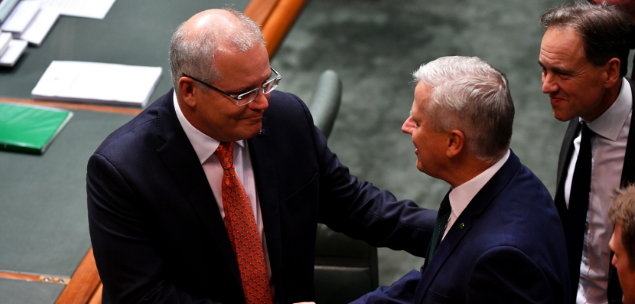The passing of $158 billion worth of personal income tax cuts will provide a much-needed short-term boost to economic growth but economists and business groups are already urging the Morrison government to do more.
Prime Minister Scott Morrison hailed his government’s first major victory since the federal election as a win for all Australians.
“This was the parliament rewarding the aspiration of Australians,” he told ABC radio on Friday.
“It’s their money, it’s not mine. They earned it and I want them to keep it.”
The Senate passed the three-stage package late on Thursday, with Labor in the end waving the legislation through after failing to get support to split the bill.
The first stage of the plan will deliver up to $1080 to low and middle-income earners when they lodge their tax returns in coming months.
The Australian Taxation Office confirmed on Friday taxpayers who have already lodged returns will receive any tax offset they are entitled to.
The second stage will top up a low-income tax offset, which means more people – earning up to $45,000 instead of $41,000 – will get a 19 per cent tax rate.
The contentious third stage that Labor tried to block flattens the tax rate from 32.5 per cent to 30 per cent for people earning between $45,000 and $200,000 from mid-2024.
“This is a critical first step to ensure the Australian economy can grow faster,” Business Council of Australia chief executive Jennifer Westacott said of the tax package.
Reserve Bank governor Philip Lowe has repeatedly urged the government to lift spending beyond the tax cuts to help lift economic growth.
Mr Morrison warned against over-interpreting the governor’s remarks.
“What he’s saying is get the infrastructure activity happening and that’s exactly what we are doing,” he said.
But PwC’s chief economist Jeremy Thorpe says national productivity needs a boost through a combination of new infrastructure spending, cuts to red tape, reform of the superannuation system and further growth in workforce participation.
“We need to ensure we are not seduced by ‘shovel-ready’ construction projects that are not real productivity enhancements,” he said.
“Building for building’s sake is a sugar hit rather than an economic health boost.”
Opposition Leader Anthony Albanese said Labor will review its position on the final tax stage closer to the next election.
“What we did this week was always support, as we did during the election campaign, stage one of the tax cuts. We always supported that,” he told reporters.
But Greens leader Richard Di Natale attacked Labor and the Senate crossbench for supporting the tax cuts, saying it was a “very dark day in Australian politics”.
“We have got the Labor Party becoming the Liberal Party-lite.”
Tasmanian independent Jacqui Lambie and the two Centre Alliance senators don’t appear to have anything tangible coming from their negotiations at this stage.
Senator Lambie lobbied for her state’s $157 million public housing debt to be erased or renegotiated in return for her support.
Chief government negotiator and Finance Minister Mathias Cormann said he would work through the issue over the next six to eight weeks but stopped short of any commitment to wipe the debt.
Centre Alliance also initially boasted about securing a deal to lower gas prices before being forced to admit the guarantee amounted to a “draft policy”.
Senator Cormann rejected suggestions of a “special deal” with the minor party.

